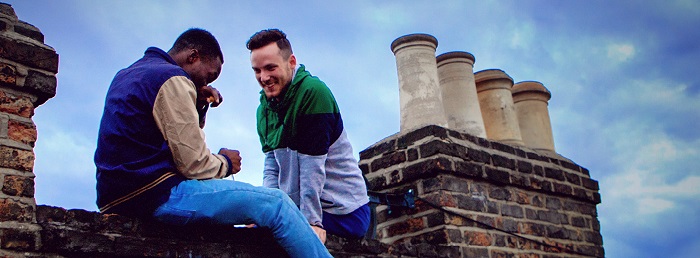
Drugs, sex and rooftop soul-searching are not a classic cocktail but, in John O’Donovan’s debut play If We Got Some More Cocaine I Could Show You I Love You (Red Lion Theatre until 24 September), that’s what we’re in for. His choice to co-opt one of the great generational changes de nos jours is a smart move and an enticing prospect.
A half-arsed robbery and an even more half-arsed escape sees two petty thieves literally spending a night on the tiles in Ennis, Ireland. As they hole up on a roof waiting for the right moment to leg it, London-born teenager Casey (Ammar Duffus) and his partner-in-crime Mikey (Alan Mahon) dissect their respective situations and confront their feelings for each other.
O’Donovan’s very intimate drama plays out against a much larger picture of a country still adjusting to a new sexual landscape. Homosexuality was only decriminalised in 1993 and last year Ireland became the first country in the world to legalise gay marriage after a public vote on the issue.
This seachange wasn’t as smooth as hindsight would paint it. A case in point is Rory O’Neill’s treatment at the hands of Ireland’s national public broadcaster RTÉ. As the alter ego of Dublin drag queen Panti Bliss (who O’Donovan namechecks in this play), O’Neill was invited to discuss the upcoming referendum and, at the prompting of the interviewer, listed a number of newspaper journalists and organisations that he believed were “people who actively campaigned for gay people to be treated less or treated differently” and who were in his opinion “homophobic”.
Following threats of legal action from those named, the channel not only apologised on air to Breda O’Brien, Catholic lobby group The Iona Institute, and writer and broadcaster John Waters but paid damages of 80,000 Euros to the Institute too. RTÉ went further, adding salt to this gaping wound by removing O’Neill’s speech from its online channel, claiming this was in part to do with the recent death of Iona Institute employee Tom Gorman. Quite how that tragic incident directly related to O’Neill’s accusations was never unexplained.
Three weeks later, RTÉ decided to hold another debate, this time on the definition of homophobia. O’Neill opted not to air his views in a television studio this time but took to the Abbey Theatre’s stage in Dublin. In a speech that went viral across the globe, O’Neill laid out his personal experiences of homophobia.
It is against this historic backdrop that we explore Mikey and Casey’s stormy relationship. O’Donovan’s attempts to vivify modern Irish attitudes to gay men never lacks for humour or wit. There are some very dark moments in the play which are mined for all they are worth but they are never far from a spot of levity.
O’Donovan also successfully explores notions around nostalgia (apparently still not as good as it used to be) and a sense of place: is it better to stand your ground and deal with what comes (like Mikey) or to cut-and-run in the hope of finding an improved set of circumstances (like Casey’s parents)?
Thomas Martin’s nuanced direction brings real pathos to both characters. Georgia de Gray’s staging, which mainly consists of a large rooftop and a leaf-strewn gutter, allows the actors to intersperse the wordier episodes with some adept physical comedy and clowning.

The play, though, suffers from some structural difficulties. One minute, we are invested in these characters as on-the-run ragamuffins, high on adrenalin and fear with their simple ambitions reflected in their scruffy clothing and rough language; the next, we are plunged into a pit of anger and grief and loss and frustration. The tonal change is abrupt and we can almost hear the dramatic gears smashing into each other as O’Donovan attempts to change direction and pace.
The script lacks tightness and veracity in places. There’s one too many thousand-yard stares as Mikey or Casey relive past experiences while gazing into space; the more heavy-handed speechifying never approaches the succinctness or emotional depth of Panti Bliss’ speech. The dialogue is at times more prosaic than poetic and occasionally comes up with out-of-tune clunkers like “(I saw) Fuck all…the scummy yellow light from cars speeding home and the street lamps that switched on too soon.”
Cocaine has a ludicrously long name which – considering that the eponymous drug is more MacGuffin than not – is maybe what passes for dramatic willy-waving these days. As with most penises, the title’s prestigious length sadly does not translate to an equivalent amount of audience pleasure but, like its characters, O’Donovan’s debut is a funny and engaging production with a few rough edges and real heart.
